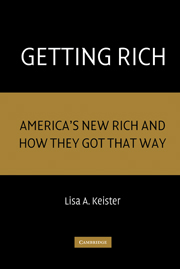Book contents
6 - Family Background: Culture and Religion
Published online by Cambridge University Press: 05 June 2012
Summary
Family culture during childhood may also affect adult wealth accumulation and mobility. I argued in Chapter Four that families – their practices, interaction patterns, and styles with which the family members behave – vary in qualitative ways that may affect the life trajectories and adult well-being of children. Yet evaluating the effects of family culture can be difficult because culture is difficult to measure. Religious beliefs and practices, however, are an important exception. Religion is a relatively tangible indicator of culture that can be measured and studied empirically. Religion can also be an important attribute characterizing a family, and it is clear that religion affects such outcomes as fertility, marriage, and work behavior (Alwin 1986; Ellison, Bartkowsi, and Segal 1996; Lehrer 1996a, 1996b; Sherkat and Ellison 1999). In Chapter Four, I extended these ideas to propose that religious upbringing will affect adult wealth indirectly through its effect on education and the outcomes that education affects, such as marriage and fertility. I also argued that religion affects wealth directly because it shapes the strategies of actions and sets of competencies on which people draw while making important decisions. In this chapter, I explore these proposals empirically. Figure 5.1 highlighted the portion of the full conceptual model (Figure 4.1) that I began to explore in Chapter Five and that is the focus of this chapter.
- Type
- Chapter
- Information
- Getting RichAmerica's New Rich and How They Got That Way, pp. 143 - 172Publisher: Cambridge University PressPrint publication year: 2005

